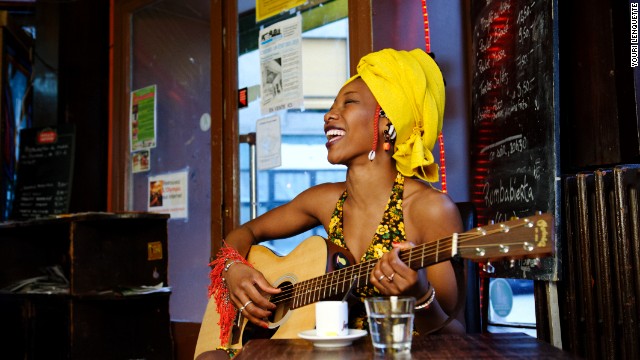African Voices is a weekly show that highlights Africa’s most engaging personalities, exploring the lives and passions of people who rarely open themselves up to the camera. Follow the team on Twitter.
From the moment she steps onto the stage, lighting up the concert hall with her radiant smile and striking flowing dress, to the very last notes of her energy-filled show, which finds everyone at their feet, it’s easy to see why Fatoumata Diawara feels right at home while performing.
“I like to be on stage,” says the 31-year-old singer, one of the latest stars to come out of the seemingly endless reservoir of musical talent that is Mali. “It’s one of my favorite places, I love that.”
Indeed, under the stage lights of Yoshi’s in San Francisco, Diawara’s Malian influence and personal charisma shine through.
Guitar on hand, she sings effortlessly in a warm, wavering voice but she can as easily break into powerful vocal solos and high-pitched ululations; as the evening progresses, she takes the audience into a journey of rhythms and emotions. With boundless energy, she strides across the stage, her braided hair swirling around frenziedly as she dances with abandon.

First passion
Even as a child, the versatile performer, who was born in the Ivory Coast to Malian parents in 1982, was very much into singing and dancing. But even though she was already a member of her father’s dance troupe at a very young age, it was Diawara’s talent in acting that first wowed audiences and paved her way to stardom.
At the age of nine, Diawara was sent to live with her actress aunt to the Malian capital Bamako. One day, while she was on the set of one of her aunt’s films, the director asked the young Diawara to play a small role.
The part was only a few lines, but the exposure would lead to much larger roles. In 2001, she starred as the title character in “Sia, Le Reve Du Python,” a highly successful film that boosted Diawara’s reputation in Mali — to this day many people in the West African country refer to her as Sia — and also attracted interest from abroad.
Fleeing marriage
In the 2001 drama, Diawara plays a young woman who flees her family to avoid being sacrificed to a god — a role that has real life echoes for Diawara.
Shortly after the release of the film, Jean-Louis Courcoult, director of famous French theater company Royal de Luxe, traveled to Mali to offer Diawara a part in a new production.
But Diawara’s aunt, who had guardian’s rights, objected to the idea and arranged for her 19-year-old niece to be married to one of her cousins.
Going against tradition, Diawara took the bold decision to flee Mali and pursue her dream. After making all the necessary preparations in secrecy, she managed to slip out of her aunt’s house and catch a flight to Europe.
New life, new career
Once in France, Diawara became a member of Royal de Luxe, traveling around the world for more than six years. Her new career also afforded her many other opportunities, including invitations to record songs with Malian musicians in Paris.
Fatoumata Diawara, Malian singer
After getting a taste of life as a musician, Diawara decided to pursue it on her own. She taught herself how to play the guitar, recorded a demo and stared performing at cafés in Paris.
“I said, ‘OK my voice can be a good way to express who I am; what is my story; where I come from,'” says Diawara, who released her first album, “Fatou,” in 2011. In the critically-acclaimed album, she explores familiar subjects, including women’s issues and arranged marriages.
“They wanted to give me to a man/but I refused as I didn’t love him/I want to choose a man for myself/who I love,” Diawara can be heard singing in “Bissa,” echoing her personal experience.
Giving back
Once she left Mali, Diawara never looked back. That was until last year, when a crisis threatened to destroy the country’s rich music heritage.
In March 2012, a military coup sent the country’s president into hiding. That opened the door to insurgency by Islamic militants who began to enforce their strict interpretation of Sharia law, including a ban on music.
Diawara, who was still living in Paris, felt compelled to do something to ensure the great traditions of the music she loves live on. She went back to Mali and rallied 40 of the country’s most popular artists, including kora maestro Toumani Diabate and legendary singer Oumou Sangare, to record a song calling for peace titled “Mali ko.”
Once back in her country, Diawara also reconnected with her family, making amends. It was also a chance for her to give back to the beloved country she fled but which still influences her music.
“I’m not a politician, I’m nobody,” she says, “but it is about my country; my Earth, where I’m from. My roots, my story, my family.”
Back in San Francisco, Diawara takes a bow amid loud cheers as she leaves the stage following yet another energetic performance.
“I enjoy being with my audience because I know what I did to be in front of them,” she says after the concert. “That’s why I like this moment; it’s my freedom,” she adds. “Music is my best friend.”
SOURCE: CNN Africa



